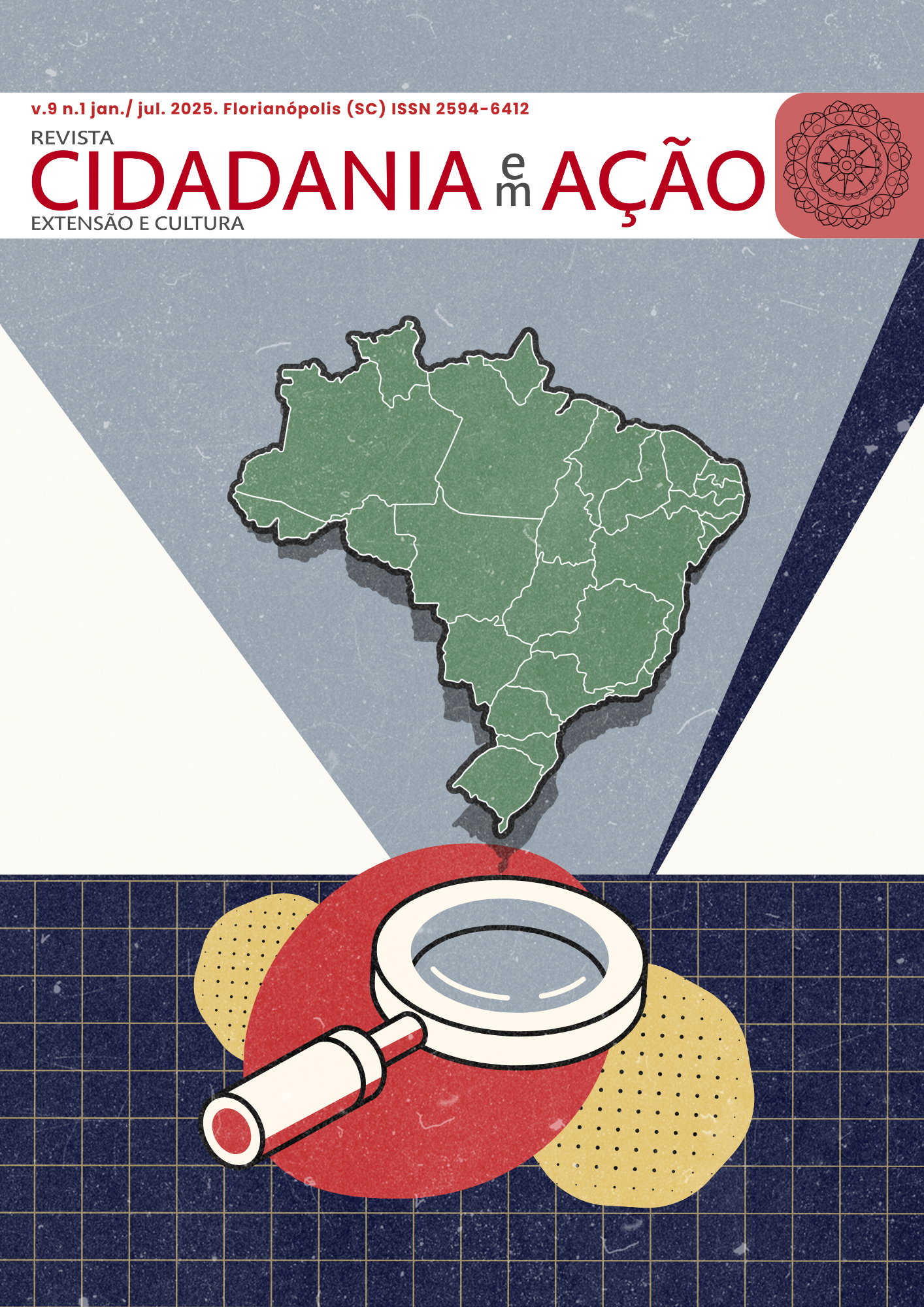STI PREVENTION AT LGBTQIA+ EVENTS
Expanding the locations of health education
DOI:
https://doi.org/10.5965/259464120901e187198Keywords:
Health education, Sexually Transmitted Diseases, Sexual and Gender MinoritiesAbstract
Sexually Transmitted Infections (STIs) are health issues that considerably affect young people. Therefore, this group represents a key population in the prevention of these infections, and it is the health network's responsibility to reach them specifically. The present paper has as its theme the STI prevention actions carried out by ISTeja Prevenido Collective in locations not covered by health units' actions such as bars, nightclubs, and parties/events attended by young people and the LGBTQIA+ population. The objective was to contribute to the policies of public health care services concerning the prevention of STIs. Two actions were developed in 2022: at the Gaymada event and Moonlight nightclub, both aimed at the LGBTQIA+ public. The Collective’s participation in the Gaymada event happened with a stand where it presented itself. The principal manners of STI prevention were reinforced to the present public and artists. It also counted the distribution of internal and external condoms, lubricants, self-tests for HIV, and informational pamphlets on STI prevention, including where to seek specialized help. In the Moonlight nightclub, the guidelines given to the population focused on HIV/AIDS prevention, using casual language and costumes by the members. Both objected to obtaining the approximation and acceptance of the present public. In addition, the distribution of informative materials, self-tests for HIV, condoms, and condom holders was realized, with the installation of boxes containing condoms in the establishment's bathrooms. As a result of these activities, the approached public in both events showed interest in the theme, maintaining dialogues with the members during the actions. People assimilated the relevance of condom distribution and were clarified regarding its correct use, discussed STIs without taboo, and carried out the self-test for HIV as a form of prevention and, consequently, health conservation. The public contemplated in the Gaymada action was approximately 50 people, while the event in Moonlight reached around 150 individuals. Health education actions focused on preventing STIs must be part of preventive actions aimed at young people. Expanding these actions to different spaces with multiple approaches is essential for resolving public health issues, such as STIs spread. By being available in usually neglected and judged locations, the collective enables an exchange of experiences. Additionally, members can relate theory and practice, benefiting themselves - through improving their skills and knowledge - and the population through access to quality information and supply of materials for infection prevention. Finally, there is an expansion of the possibility of reaching younger people that sometimes do not seek health services.
Downloads
References
BRASIL. Ministério da Saúde. Boletim Epidemiológico HIV/Aids 2022. Brasília: Ministério da Saúde, 2022.
BRASIL. Ministério da Saúde. Boletim Epidemiológico Sífilis 2022. Brasília: Ministério da Saúde, 2022.
BRASIL. Ministério da Saúde. Caderno de Educação Popular e Saúde. Brasília: Ministério da Saúde; 2007.
BRASIL. Ministério da Saúde. Infecções Sexualmente Transmissíveis (IST). Brasília: Ministério da Saúde, 2022. Disponível em: https://www.gov.br/saude/pt-br/assuntos/saude-de-a-a-z/i/ist. Acesso em: 10 jan. 2023.
BRASIL. Ministério da Saúde. Protocolo clínico e diretrizes terapêuticas para atenção integral às pessoas com Infecções Sexualmente Transmissíveis – IST. Brasília: Ministério da Saúde, 2022.
BRÊTAS, J. R. da S.; PEREIRA, S. R. Projeto de extensão universitária: um espaço para formação profissional e promoção da saúde. Trabalho, Educação e Saúde, [s.l.], v. 5, n. 2, p. 367-380, 2007.
CARRARA, S. Moralidades, racionalidades e políticas sexuais no Brasil contemporâneo. Mana, [s.l.], v. 21, n. 2, p. 323-345, 2015. Disponível em: https://www.scielo.br/j/mana/a/6D5zmtb3VK98rjtWTQhq8Gg/?lang=pt#. Acesso em: 13 jan. 2023.
COELHO, R. T.; LUZ, E.; JÚNIOR, E. F. D. C. Atletas transgêneros: tabu, representatividade, minorias e ciências do esporte. Revista de Trabalhos Acadêmicos UNIVERSO, São Gonçalo, v. 3, n. 5, p. 29-58, 2018.
HOOD, J. E.; FRIEDMAN, A. L. Unveiling the hidden epidemic: a review of stigma associated with sexually transmissible infections. Sexual Health, v. 8, n. 2, p. 159, 2011. Disponível em: https://pubmed.ncbi.nlm.nih.gov/21592429/. Acesso em 13 jan. 2023.
OLIVEIRA, G. S.; NOGUEIRA, J. D. A.; COSTA, G. P. O.; MEDEIROS, R. L. S. F. M.; TEÓGENES, O.; ALMEIDA, A. S. Serviços de saúde para lésbicas, gays, bissexuais e travestis/transexuais. Revista de Enfermagem UFPE, [s. l.], v. 12, n. 10, p. 2598-2609, out. 2018. ISSN 1981-8963. Disponível em: https://periodicos.ufpe.br/revistas/revistaenfermagem/article/view/237014. Acesso em: 10 jan. 2023.
SANTANA, R. R. et al. Extensão universitária como prática educativa na promoção da saúde. Educação & Realidade, v. 46, n. 2, e98702, 2021. Disponível em: https://www.scielo.br/j/edreal/a/qX3KBJghtJpHQrDZzG4b8XB/#. Acesso em: 21 ago. 2024.
SILVERBERG, B. et al. 2021 CDC update: Treatment and complications of Sexually Transmitted Infections (STIs). Venereology, [s. l.], v. 1, n. 1, p. 23-46, 2022. Disponível em: https://www.mdpi.com/2674-0710/1/1/4. Acesso em: 12 jan. 2023.
SPINDOLA, T.; SANTANA, R. S. C.; ANTUNES, R. F.; MACHADO, Y. Y.; MORAES, P. C. A prevenção das infecções sexualmente transmissíveis nos roteiros sexuais de jovens: diferenças segundo o gênero. Ciência & Saúde Coletiva, [s. l.], v. 26, n. 07, p. 2683-2692, 2021. DOI: 10.1590/1413-81232021267.08282021. Disponível em: https://doi.org/10.1590/1413-81232021267.08282021. Acesso em: 10 set. 2024.
WORLD HEALTH ORGANIZATION. Global health sector strategies on, respectively, HIV, viral hepatitis and sexually transmitted infections for the period 2022-2030. Geneva: World Health Organization, 2022.
Downloads
Published
How to Cite
Issue
Section
Categories
License
Copyright (c) 2025 Citizenship in Action: Extension and Culture Magazine

This work is licensed under a Creative Commons Attribution 4.0 International License.












